- Page 1 and 2: Dialogic Reading with Emotion-Laden
- Page 3 and 4: Dedication This is dedicated to the
- Page 5 and 6: Annette Alcon Lorene Lucero Tracy A
- Page 7 and 8: Table of Contents Page List of Tabl
- Page 9 and 10: Appendices ........................
- Page 11 and 12: Abstract DIALOGIC READING WITH EMOT
- Page 13 and 14: 1. Introduction Improving both lite
- Page 15: 2. Literature Review Literacy Devel
- Page 19 and 20: (i.e., education and experience), a
- Page 21 and 22: school-aged years. Demonstrating co
- Page 23 and 24: interest; direct teaching of word r
- Page 25 and 26: Literacy Prevention and Interventio
- Page 27 and 28: ended prompts, or statements encour
- Page 29 and 30: delayed children (Crain-Thoreson &
- Page 31 and 32: implemented social-emotional preven
- Page 33 and 34: contempt, and fear. Dyads were then
- Page 35 and 36: families that interact with a child
- Page 37 and 38: exposure to both acute and chronic
- Page 39 and 40: In Garner et al.‘s (1997) study,
- Page 41 and 42: 1. Books should be developmentally
- Page 43 and 44: Social-Emotional Prevention and Int
- Page 45 and 46: Denham and Burton‘s (1996) social
- Page 47 and 48: effectively manage the emotional ex
- Page 49 and 50: children‘s literacy and social-em
- Page 51 and 52: centered approach. Cluster analyses
- Page 53 and 54: Intervention Programs and Curricula
- Page 55 and 56: PEEP programming supplemented child
- Page 57 and 58: In addition to enhancing emergent l
- Page 59 and 60: intervention aimed to enhance the d
- Page 61 and 62: month, Whitehurst et al., 1988; 7 m
- Page 63 and 64: efficacy of the use of a dialogic r
- Page 65 and 66: additional adult present for larger
- Page 67 and 68:
asis; and some classrooms included
- Page 69 and 70:
oth English and Spanish. Approximat
- Page 71 and 72:
Experimental Design and Procedure T
- Page 73 and 74:
At the time that children were recr
- Page 75 and 76:
score of 0 for incorrect responses
- Page 77 and 78:
questioning for each child (Denham
- Page 79 and 80:
the affective labeling and affectiv
- Page 81 and 82:
Focused Use of Personal Energy item
- Page 83 and 84:
was not participating in the resear
- Page 85 and 86:
esearchers again began successively
- Page 87 and 88:
prepare anything for meetings. Teac
- Page 89 and 90:
informational video on the importan
- Page 91 and 92:
names of participating children) be
- Page 93 and 94:
Table 16 includes the intervention
- Page 95 and 96:
teachers were instructed to complet
- Page 97 and 98:
program implementation to assess in
- Page 99 and 100:
anged from 37 to 117, with high sco
- Page 101 and 102:
4. Results Exploratory Data Analyse
- Page 103 and 104:
storybook readings, assistant teach
- Page 105 and 106:
eading control group assignment) an
- Page 107 and 108:
An independent samples t-test inclu
- Page 109 and 110:
In order to determine whether there
- Page 111 and 112:
Results indicated that there was no
- Page 113 and 114:
intervention TOPEL Definitional Voc
- Page 115 and 116:
storybook readings positively predi
- Page 117 and 118:
Results also revealed findings for
- Page 119 and 120:
subscale ranges, indicating that te
- Page 121 and 122:
independent variables will simply b
- Page 123 and 124:
(∆R 2 step two = .01, ns). Only p
- Page 125 and 126:
This inclusion of a covariate adjus
- Page 127 and 128:
Results also revealed a main effect
- Page 129 and 130:
5. Discussion The present study ass
- Page 131 and 132:
positively predicted children‘s p
- Page 133 and 134:
may have been at work, particularly
- Page 135 and 136:
day schedules and because teachers
- Page 137 and 138:
engaged in storybook discussions. T
- Page 139 and 140:
dialogic reading techniques as cost
- Page 141 and 142:
introduction to intervention storyb
- Page 143 and 144:
enefits. Further, because storybook
- Page 145 and 146:
Education and Educational Policy Im
- Page 147 and 148:
statistically significant mean diff
- Page 149 and 150:
137 Table 1 Continuous Demographic
- Page 151 and 152:
139 Table 3 Categorical Demographic
- Page 153 and 154:
141 Table 4 Experimental Design Pre
- Page 155 and 156:
What are they for? To eat, bite, ch
- Page 157 and 158:
Table 6 Cronbach’s Alpha Values f
- Page 159 and 160:
Item 6 The child shows very negativ
- Page 161 and 162:
to another‘s emotional display (u
- Page 163 and 164:
Table 9 Rotated Component Matrix fo
- Page 165 and 166:
Table 11 Intercorrelations Between
- Page 167 and 168:
Table 13 Minnesota Preschool Affect
- Page 169 and 170:
Table 15 Differences Between and Si
- Page 171 and 172:
Table 17 Teacher Attitudes about So
- Page 173 and 174:
Table 19 Descriptive Data for Inter
- Page 175 and 176:
Table 21 Percentages of Storybook R
- Page 177 and 178:
Table 23 Hierarchical Regression An
- Page 179 and 180:
Table 25 Hierarchical Regression An
- Page 181 and 182:
Table 27 Beta Values for Statistica
- Page 183 and 184:
Table 29 Hierarchical Regression An
- Page 185 and 186:
Table 31 Hierarchical Regression An
- Page 187 and 188:
Table 33 Analysis of Covariance Bet
- Page 189 and 190:
Table 35 Multiple Analyses of Covar
- Page 191 and 192:
when Alexander visited his daddy‘
- Page 193 and 194:
Appendix B Teacher Informed Consent
- Page 195 and 196:
Appendix C Parent Informed Consent
- Page 197 and 198:
Appendix D PARENT QUESTIONNAIRE Nam
- Page 199 and 200:
19. Stove What is this? .18 .31 Wha
- Page 201 and 202:
Appendix G Affect Knowledge Test (D
- Page 203 and 204:
6. [sibs] A. HAPPY: Nancy/Johnny:
- Page 205 and 206:
Appendix H Corrected Item-Total Cor
- Page 207 and 208:
Acts pouty or sullen -.02 .38 Displ
- Page 209 and 210:
Appendix K Stony Brook Emergent Lit
- Page 211 and 212:
You will need to make up your own o
- Page 213 and 214:
Second, emotion-coaching parents se
- Page 215 and 216:
Appendix N Guidelines for Weekly St
- Page 217 and 218:
Spending time on SDP lessons takes
- Page 219 and 220:
List of References 207
- Page 221 and 222:
Cohen, J., Cohen, P., West, S. G.,
- Page 223 and 224:
Gottman, J. M., Katz, L., & Hooven,
- Page 225 and 226:
Miller, A. L., Gouley, K. K., Seife
- Page 227 and 228:
Yeung, W. J., Linver, M. R., & Broo



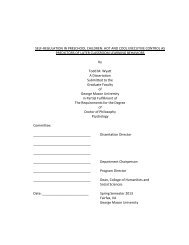
![[Sample B: Approval/Signature Sheet] - George Mason University](https://img.yumpu.com/21978828/1/190x245/sample-b-approval-signature-sheet-george-mason-university.jpg?quality=85)
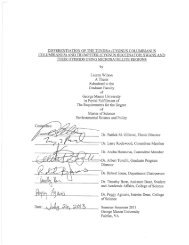
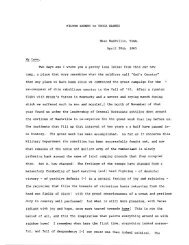
![[Sample B: Approval/Signature Sheet] - George Mason University](https://img.yumpu.com/18694905/1/190x245/sample-b-approval-signature-sheet-george-mason-university.jpg?quality=85)
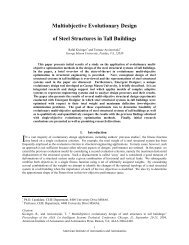
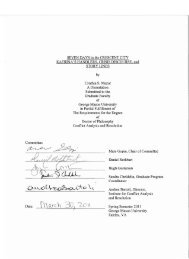
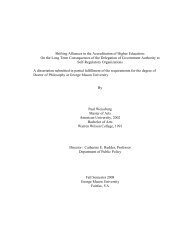
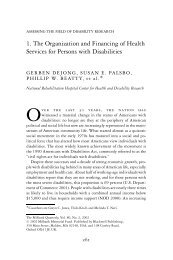
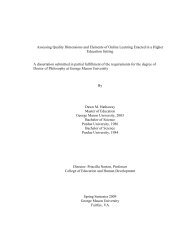
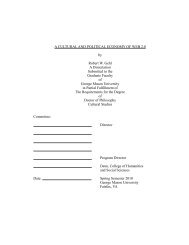
![[Sample B: Approval/Signature Sheet] - George Mason University](https://img.yumpu.com/18694552/1/189x260/sample-b-approval-signature-sheet-george-mason-university.jpg?quality=85)
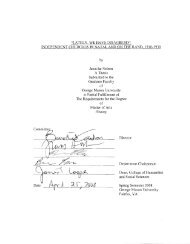
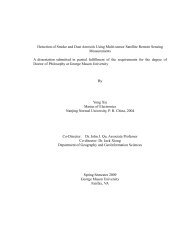
![[Sample B: Approval/Signature Sheet] - George Mason University](https://img.yumpu.com/18694474/1/190x245/sample-b-approval-signature-sheet-george-mason-university.jpg?quality=85)